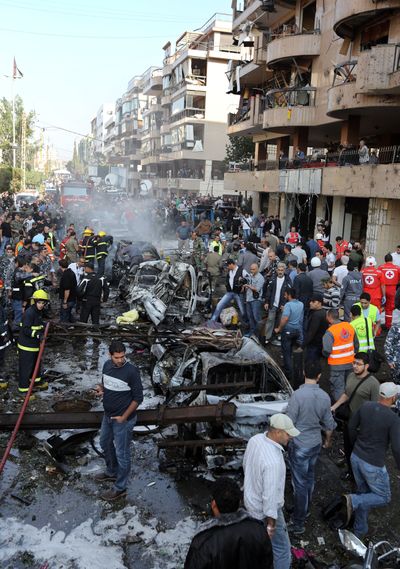Blasts rock Iranian Embassy in Lebanon, at least 23 dead

BEIRUT – A double suicide bombing of Iran’s embassy in Lebanon that killed at least 23 people and wounded hundreds of others sent shockwaves of fear across this capital city Tuesday that Syria’s civil war would trigger violence not seen since this country’s own civil war two decades ago.
A mysterious local franchise of al-Qaida took responsibility for the attack and said similar attacks would continue until Iran and its Lebanese Shiite ally, Hezbollah, withdraw their fighters from Syria, where they have played a crucial role in turning the tide of battle in favor of President Bashar Assad.
Many in Beirut feared the Shiite militant group would retaliate and push Lebanon into further sectarian violence.
A senior Hezbollah official at the scene described the bombings as a “message of blood and death” from al-Qaida-styled militants fighting to topple Assad. Mahmoud Komati said the attack was a response to the “successive defeats suffered by (jihadists) in Syria.”
With pro-Assad forces racking up victories throughout Syria in recent months, the group that claimed responsibility for the blast, the al-Qaida-affiliated Abdullah Azzam Brigades, promised more attacks until Hezbollah’s and Iran’s forces leave Syria.
In a statement, the Azzam spokesman, Sirajuddin Zurayqat, called the perpetrators of the suicide attacks “Lebanese Sunni heroes” and said “operations in Lebanon will continue” until Hezbollah units have left Syria and Azzam prisoners are released by Lebanese authorities.
In Washington, Secretary of State John Kerry condemned the attack, calling it “senseless and despicable.” He pledged that the United States would continue its support to the Lebanese government and urged all parties to cooperate with the investigation.
Both witnesses and the Lebanese army described the attack as following what has become a familiar one-two punch for terrorists: the first attacker, riding a motorcycle packed with a small explosive charge, targeted the embassy’s heavy external security, followed a few moments later by a much larger bomb carried by a car that targeted the building itself.
“There was an explosion then after a bit, another much larger explosion,” said Mahmoud Abbas, who sells coffee from a pushcart near the embassy.
Although the area around the embassy is seen as broadly supportive of Hezbollah, the building is not located in one of Hezbollah’s special “security zone” neighborhoods, which have been under massive security precautions since several rocket and car bomb attacks earlier in the summer. But the kind of tight security precautions that prevail in those security zones, where nearly every car is searched and traffic is frequently banned, were not in place in the affluent area where the embassy is located.
“Embassies have to be open; they’re very hard to protect,” said a harried Hezbollah security official in a brief phone call after the blast.
The explosion reinforced a widespread belief among Lebanon’s strongly pro-Hezbollah Shiite population that it would remain a target of jihadist groups that have flooded Syria to take part in the anti-Assad insurgency.
“They are not Muslims; they are animals,” Miriam, a local resident who declined to give her last name because of security concerns, said as she went to find her children at a nearby school. “They will never stop attacking us.”